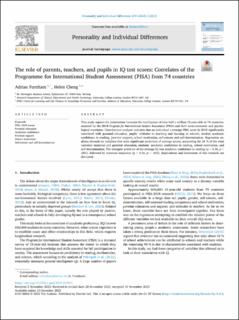The role of parents, teachers, and pupils in IQ test scores: Correlates of the Programme for International Student Assessment (PISA) from 74 countries
Journal article, Peer reviewed
Published version
Permanent lenke
https://hdl.handle.net/11250/3127204Utgivelsesdato
2023Metadata
Vis full innførselSamlinger
Sammendrag
This study reports the associations between the intelligence of over half a million 15-year-olds in 74 countries, assessed by the 2018 Program for International Student Assessment (PISA) and their socio-economic and psychological correlates. Correlational analysis indicates that an individual's average PISA score in 2018 significantly correlated with parental education, pupils' attitudes to teaching and learning in schools, student academic confidence in reading, parental support, school motivation, self-esteem and self-determination. Regression analyses showed six variables that were significant predictors of average scores, accounting for 24 % of the total variance: maternal and paternal education, students' academic confidence in reading, school motivation, and self-determination. The strongest predictor of the average IQ was academic confidence in reading (β = 0.36, p < .001), followed by maternal education (β = 0.16, p < .001). Implications and limitations of this research are discussed. The role of parents, teachers, and pupils in IQ test scores: Correlates of the Programme for International Student Assessment (PISA) from 74 countries

